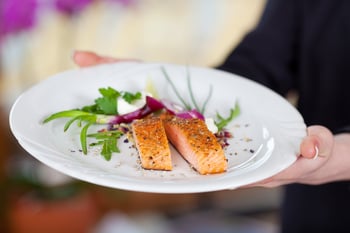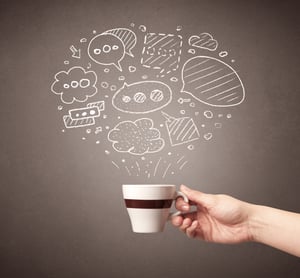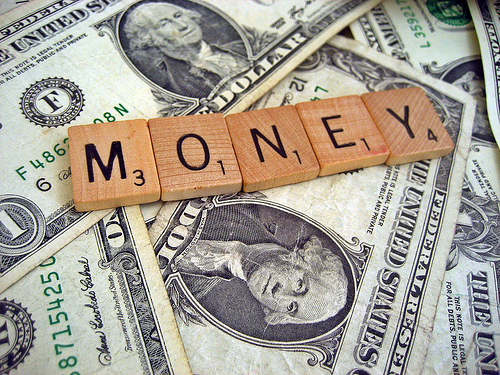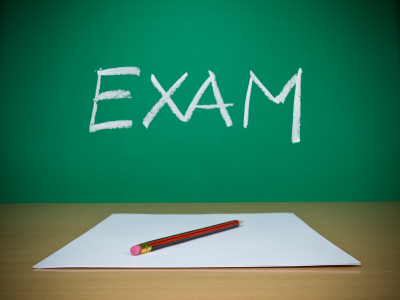Food For Thought: The Best Foods to Eat Before a Test

What you put into your body definitely affects your mind, which can either help or hinder your performance during a standardized test. The following are some items to consider before your exam.
What Should You Eat the Night Before a Test?

Plan the dinner you eat the night before the exam carefully — it will affect how you feel the next day. It’s recommended to eat a meal high in protein and Omega-3 fatty acids. Fish is a great option for this, especially cold water fish like Wild Alaskan Salmon. Omega-3’s boost brain function, which in turn makes you more alert, enabling you to concentrate better. If you’re not a fish eater, then any meal that is high in protein will be good, as long as it isn’t heavy and won’t sit in your stomach the next day.
For a side, focus on adding healthy vegetables and complex carbohydrates. While all vegetables are good, some provide more of a brain boost than others — you get the most vitamins and nutrients from raw vegetables, so chop up some peppers and carrots and sprinkle them on a spinach salad. Complex carbohydrates, such as whole grains, rice, and sweet potatoes, are another preferred brain food. They take longer to metabolize and are loaded with vitamins, minerals and antioxidants, including the memory-boosting B vitamin, folate. Since they take longer to digest, complex carbohydrates provide a slow, sustained supply of glucose, dispersing a steady source of brain fuel. This is very different from the boost we experience from sugary foods which provide an immediate but temporary lift followed by an undesirable crash.
What Should You Eat the Morning of a Test?

Protein is also important the morning of a test, a few hours before the exam. Since protein contributes to good mental clarity and overall concentration, extra protein the morning of an exam is ideal. Pre-test breakfast is also another excellent opportunity to fuel your body (and brain) with more complex carbohydrates to carry you through the test. Some great breakfast options include a whole grain cereal with low-fat milk, oatmeal with steel cut oats, eggs, lean or Canadian bacon, or sugar-free muesli. Add some blueberries, dried fruits, walnuts, flaxseed or sunflower seeds to your cereal or sugar-free yogurt to add some healthy carbohydrates and additional flavor.
What are the Best Snacks to Eat During a Test?

Make sure to bring snacks with you to the testing site. You will not be allowed to eat during the exam but eating a healthy snack during a break can help keep your energy levels throughout the exam. Consider slipping a granola, protein, or energy bar into your pocket, along with some fruit or a small bag of trail mix or almonds. Nuts are a great choice for enhancing your cognitive functioning, and some studies have even linked trail mix to improved memory!
What Foods Should You Avoid Before a Test?

Avoid anything that contains high amounts of sugar, like candy or soda. Simple sugars can lead to crashes, and you don’t want to experience a lull in your mental functioning during an exam. For the most part, avoid chocolate; however, a tiny piece of dark chocolate might improve brain function in the short term. Dark chocolate has been linked to increased blood flow to the brain and improvements in verbal fluency, perhaps because it contains stimulant substances like caffeine and theobromine.
Is Hydration Important Before a Test?

Drink plenty of water the night before and the day of the exam. Your brain needs consistent hydration in order to perform at its best. Dehydration can lead to lower levels of concentration, fatigue, and feelings of faintness, none of which you want to experience during the test. Standardized tests require you to perform at your best, so ensure your best chance of success by properly fueling your body!
Should You Drink Coffee or Energy Drinks Before an Exam?

Avoid drinks containing caffeine such as tea, coffee and energy drinks. When you consume caffeine, it acts as a stimulant. While many people feel that caffeine increases their mental alertness, it could also cause increased anxiety, dizziness, headaches, and jitters. These are the last things you need during an already stressful testing situation!
Conclusion
The last important detail is to get plenty of sleep the night before. A well fed, well-rested mind will be at its best to perform so don’t stay up late studying the night before. Trust that your hard work and preparation have already paved your way to success. The night before the exam your focus should be on eating right and getting plenty of sleep. When exam time arrives, don’t forget to take a deep breath and relax. You’ve prepared for this moment. Now just let the energy flow.


